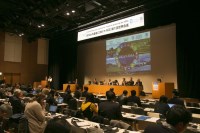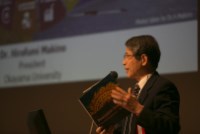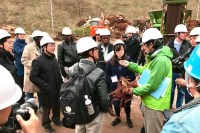Enlarge Image Symposium (Okayama University 50th Anniversary Hall)
Enlarge Image The Field trips in Maniwa
Enlarge Image
Okayama University Hosts World’s First International Conference on Attainment of Sustainable Development Goals (SDGs)
Okayama’s growing reputation for education for sustainable development
From 5-7 December 2017, Okayama University, the United Nations University Institute for the Advanced Study of Sustainability (UNU-IAS) and Regional Centers of Expertise on Education for Sustainable Development (RCE) Okayama co-hosted the first world RCE conference on the theme of the United Nations Sustainable Development Goals (SDGs) of the 2030 Agenda for Sustainable Development entitled, “First RCE Thematic Conference: Towards Achieving the SDGs”, at the Okayama Convention Center in Okayama City.
Approximately 200 representatives of international organizations, governments, academia, industry, communities, NGOs and NPOs from 26 countries attended the conference. One of the main goals of the participants was to share their ideas and best practices related to Education for Sustainable Development (ESD) and to discuss ways of finding solutions to global issues such as climate change, biodiversity, and sustainable consumption and production (of food) through plenary sessions, training capacity building workshops and field trips.
At the opening ceremony on the first day, greetings were given by Chairperson Hirofumi Abe of the Okayama ESD Promotion Commission (professor of Okayama University); President Hirofumi Makino of Okayama University; UNU-IAS Director Kazuhiko Takemoto; Mayor Masao Omori of Okayama City and Masaaki Kobayashi, Ministry of the Environment Senior Advisor (former Administrative Vice Minister for the Environment). UNU-IAS Project Director Naoya Tsukamoto also gave a talk on the current activities of the RCE Network.
Furthermore, on December 5, a plenary session entitled “Further Development of ESD towards the achievement of SDGs” was held to discuss ways how ESD practices and resources of Okayama could contribute to achieving the SDGs at local, national, regional and global levels. The panel discussion commenced with an overview on the Okayama ESD Project by Chairperson Abe, followed by case presentations by panelists from RCE Okayama, RCE Saskatchewan (Canada), RCE Denmark (Denmark) and RCE Cairo (Egypt) with focus on biodiversity, climate change and sustainable consumption and production (of food). At the conclusion of the session, Moderator Professor Kiichi Oyasu of the Center for Global Partnerships and Education provided a summary of the key discussion points and recommendations from the session that focused on opportunities for revisiting Okayama University’s on-going ESD practices and activities in view of the 17 goals under the SDGs, for future planning.
At the second plenary session, entitled “Considering SDGs from Okayama – Towards further multi-stakeholder partnerships between industry and academia for the SDGs ” to seek to promote and support the Goal 17, the main discussion was on challenges and opportunities for higher education institutions to make much wider ranging contributions to the SDGs through excellence in research and education with multi-stakeholder partnerships and other voluntary initiatives. President Makino took the podium, saying, “Resonating with the SDGs, we will create new value with the whole university progressing forward with education, research and social contributions,” followed by guest speakers from industry, Chair Masao Seki of the revision drafting group at Keidanren Charter of Corporate Behavior (Senior Adviser on CSR, Sompo Japan Nipponkoa Insurance Inc.) and Chairperson Hisashi Matsuda of Okayama Association of Corporate Executives (President and CEOO of Ryobi Holdings). As an example of Okayama University’s industry-academia cooperation, Dean of the Faculty of Engineering, Eiji Tomita, introduced the light environmental load engine being pursued as an industrial cooperation project. Additionally, Dean Yasutomo Nasu of the Graduate School of Medicine, Dentistry and Pharmaceutical Science described the development of medicines for use in gene therapy, and Associate Professor Yuta Nishina of the Research Core for Interdisciplinary Science gave an overview of his research into materials development including as ‘graphene oxide’. The session was concluded with closing remarks from Executive Vice President Hiroshi Kanzaki of Okayama University, saying, “Research and education could contribute to achieving the SDGs through collaboration and greater engagement with government, industry, let alone, civil society. Working across disciplines and sectors is also a key.”
Further plenary sessions and capacity building workshops were held on December 6. On December 7, participants visited to companies in Okayama City and Maniwa City. Okayama University students also participated in the conference and field trips as support staff. The conference was a great success.
Soon after this event, Okayama University received the special prize, the “SDGs Partnership Award” in the first Japan SDGs Awards from the Government of Japan. The recipients, companies or organizations that have made exceptional efforts contributing to the attainment of SDGs, were selected and presented with the award by the SDGs Promotion Headquarters (headed by the Prime Minister) in order to promote all-Japan action on SDGs.
With Okayama University’s collective action and response to the SDGs and solid foundation and reputation of ESD, the university actively seeks opportunities to advance the SDGs beyond academic disciplines and institutional boundaries; namely connecting research and education to society, and engaging stakeholders beyond the university. In other words, the SDGs will be a major influencer and driver for mobilizing the university’s knowledge and solutions for sustainable development while transforming its organizational behavior and culture, which makes it more distinct and attractive than ever before for a higher education destination for sustainable development.
Regional Centers of Expertise on Education for Sustainable Development (RCEs)
In 2002, the UN General Assembly adopted a resolution announcing the Decade of Education for Sustainable Development (UNDESD 2005-2014), based on the Johannesburg Plan of Implementation. The United Nations Scientific and Cultural Organization (UNESCO), the lead agency for the UNDESD, stressed the need to reorient existing education towards sustainability.
In 2003, in response to the UN resolution on the UNDESD, the United Nations University Institute for the Advanced Study of Sustainability (UNU-IAS) launched the ESD project, with funding support from the Ministry of the Environment, Japan. The ESD project designs and implements research and development activities through two flagship initiatives: a global multi-stakeholder global network of Regional Centers of Expertise on ESD (RCEs) and a network of higher education institutions called the Promotion of Sustainability in Postgraduate Education and Research Network (ProSPER.Net).
As of September 2017, 158 RCEs have officially been acknowledged by the United Nations University worldwide. The Global RCE Service Centre is headquartered at UNU-IAS, where it provides assistance to individual RCEs and facilitates their communication and networking.
RCE Okayama
RCE Okayama is a multi-stakeholder platform composed of more than 250 members of organizations, collaborating to empower people to change the way they think and work towards a sustainable future in Okayama City. Acknowledged first in the world as one of the ‘Initial Seven’ RCE’s, by the United Nations University (UNU) in 2005, RCE Okayama has been part of a coalition of 158 RCEs around the world for more than a decade.
In 2014, RCE Okayama hosted the 9th Global RCE Conference, co-organized by UNU-IAS. Input and recommendations were thereafter shared at the UNESCO World Conference on ESD in Aichi, Nagoya, partnering with UNESCO and the Government of Japan on the occasion of the end of the UN Decade of ESD (2005-2014). After 2015, RCE Okayama and Okayama City committed to further accelerating and mainstreaming ESD, by implementing the Global Action Programme (GAP), the follow-up programme to the UN Decade of ESD. In response to its vision and mission, RCE Okayama also launched the ESD Okayama Award in 2015, and offered a variety of programmes for youth and multi-stakeholders across the city and beyond.
Recently, RCE Okayama and Okayama City received prestigious global awards and recognition from UNESCO, including the UNESCO-Japan Prize on ESD 2016 and the UNESCO Learning City Award 2017. These are also significant steps in RCE Okayama’s global outreach efforts to contribute to the UN-Sustainable Development Goals (SDGS) towards a better and sustainable future for all.
Further information
About SDGs (the United Nations)
About an approach to SDGs of Okayama University (Japanese page)
Okayama University (English page)
Okayama University (Japanese page)
Reference (Okayama University e-Bulletin)
e-Bulletin vol.20: Getting ready for the SDGs




